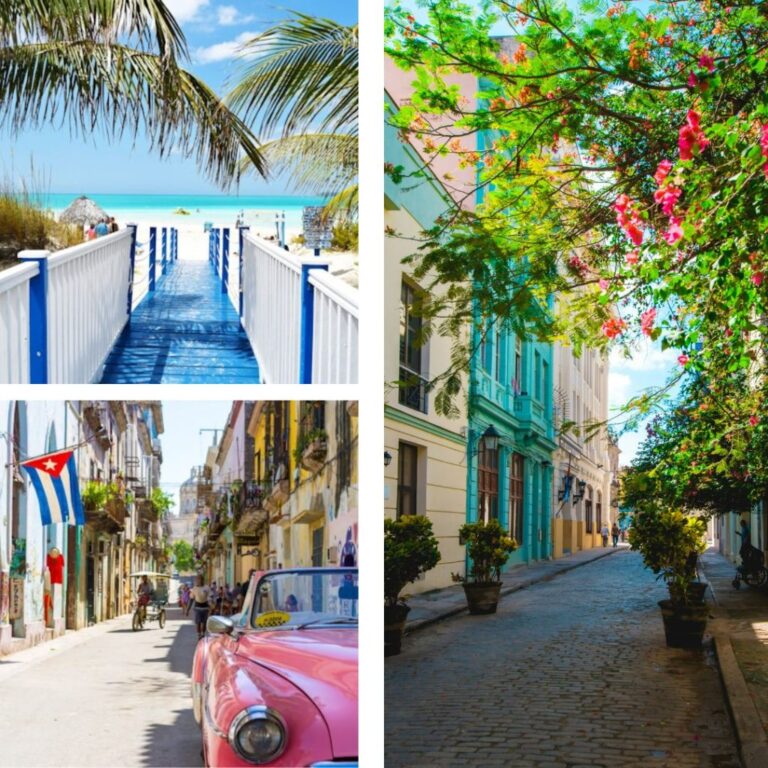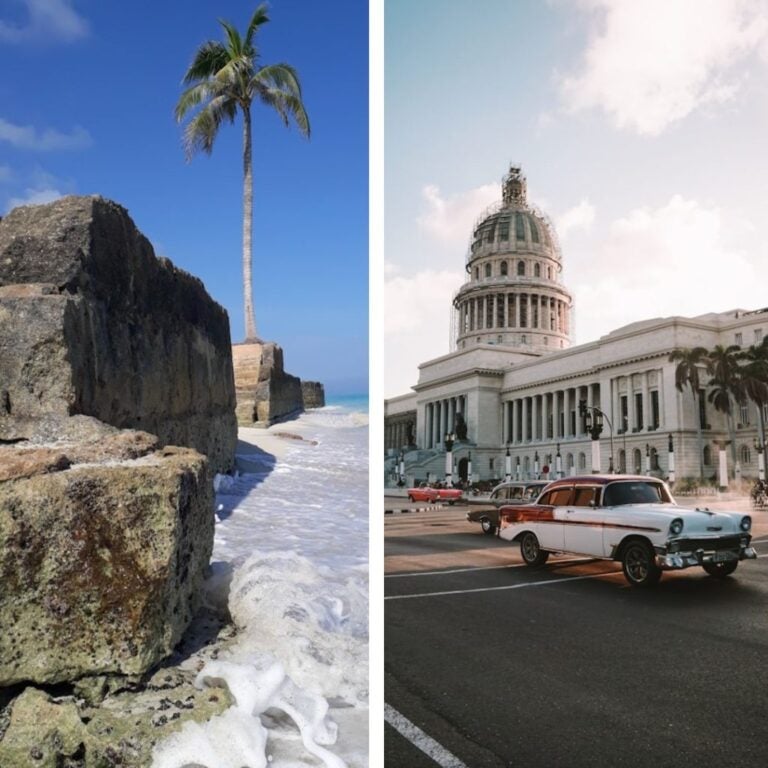Medical insurance for Cuba: What do you need?
Looking for a health insurance to travel to Cuba? In this guide you’ll find valuable information on how to hire the best.
Despite being a country that’s going through a tough political and social reality, Cuba is still an extremely attractive destination. It’s true that all-inclusive beachfront hotels no longer have the splendour of years gone by, as more and more items are becoming scarce, but that doesn’t mean you shouldn’t visit Havana, Varadero or the cays. As in every new country you visit, having medical insurance to travel to Cuba will allow you to enjoy your stay on the island, knowing that in case of any medical problem or accident, you’ll be covered.
Today, we take a closer look at medical insurance for foreigners planning to spend time in Cuba. We analyse what they offer in each case, their coverage, prices, advantages and disadvantages. If you get to the end, choosing the best medical insurance for travel to Cuba will be much easier.
Why take out a medical insurance to travel to Cuba?
Taking out medical insurance for travel to Cuba isn’t only important in terms of peace of mind, but is also a mandatory requirement for anyone wishing to enter the island. This measure taken by the Cuban authorities came into effect in 2010 and involves all foreign visitors, whether they are digital nomads, remote workers, expatriates, students or tourists. If you don’t have one, you may have to buy local insurance at the airport, which you will end up paying a lot more than if you buy it in advance.
Note also that medical services for tourists are expensive. For example, a medical consultation can cost between $30 and $50, while a night of hospitalization is around $500. In addition, tourists are often referred to international clinics, such as the Cira Garcia Clinic in Havana, where costs are significantly higher than in the public system. If you have medical insurance, you can access these facilities without worrying about the costs.
In short, taking out medical insurance for travel to Cuba is not only a legal requirement, but also a way to protect yourself against medical and financial contingencies during your trip. Choosing insurance with adequate cover’ll allow you to enjoy your visit to the island with peace of mind and without worries.
Which foreigners need medical insurance in Cuba?
No matter what your reason for coming to Cuba, you’ll need to have medical insurance, otherwise you won’t be able to enter the country. However, the reasons for needing one may vary depending on the type of traveller you are. Here we explain who needs it and why:
- Tourists: Do you dream of spending a few days relaxing on a white sandy beach in front of the crystal clear sea? Or strolling through Havana’s historic and colourful streets? As well as a good travel itinerary, you’ll need medical insurance to cover you for any eventuality that may occur during your stay. Remember that health services are not free for foreigners and fees can be high!
- Digital nomads: You may also arrive on the island with the aim of working from Havana, for example, for the outside world. In that case, you’ll also need medical insurance. While connectivity can be a challenge, many digital nomads choose Cuba as a destination. Similar is true for the quality of the health care system, so it’s essential to have medical insurance that provides comprehensive coverage for emergencies and regular consultations.
- International students: Cuba is a popular destination for foreign students, especially in areas such as medicine. However, please note that in order to obtain a student visa, you’ll be required to present a medical insurance approved by the Cuban authorities. This insurance should cover emergencies, hospitalisation and general care throughout your stay.
- Expatriates and temporary workers: If you move to Cuba for work or personal reasons, you’ll also need medical insurance with broader coverage, including regular consultations, specific treatments and coverage in emergency situations.
- Pensioners and senior citizens: What could be better than the tropical climate and the Cuban rhythm to enjoy a well-deserved retirement? The idea of retiring to this beautiful country sounds good. But be sure to take out medical insurance that includes care for chronic illnesses, frequent check-ups and access to medication, as you may need it because of your age.

What type of medical insurance is required for foreigners traveling to Cuba?
When choosing medical insurance for travel to Cuba, there are a number of factors to consider. For a start, your needs (e.g. if you have any pre-existing medical conditions or are prone to specific health problems). You should also consider how long you plan to spend in the country and how much money you can or want to spend on insurance. You can then choose from the main types of medical insurance available:
1. International medical insurance
They’re ideal for frequent travellers looking for global coverage, i.e. in and out of the country. Some companies that provide this type of service are Allianz Care, Cigna Global and Aetna International, all of which are world-renowned and have plans that include all kinds of benefits:
- Medical emergencies and hospitalisation.
- Specific surgeries and treatments.
- Medical repatriation.
- Multi-country coverage.
The only disadvantage of this type of insurance is that its costs are high compared to local options. But you’ll have the peace of mind that you’ll receive quality care in any country.
2. Local medical insurance
Local medical insurance is designed for long-term residents in Cuba, although it’s also available to tourists who won’t be staying long on the island. While there are several options, the best known is Asistur, which is the main local provider.
The coverage of this type of plan includes:
- General and specialised consultations.
- Essential medicines.
- Hospital care.
The advantage of local insurance is that it has more affordable rates compared to international insurance. The downside is that the coverage provided is limited and does not provide access to services outside Cuba.
3. Temporary insurance
Temporary insurance is ideal for tourists who’re going to spend short stays in the country. We could say that they are the typical insurance that you take out if you go on holiday. With them you’ll be covered for medical emergencies, one-off consultations and hospitalisations, the basics in case you have an accident or health problem. A well-known example is Assist Card, although there are many other options.
Such plans are usually inexpensive and easy to sign up for, although they don’t cover chronic illnesses or long-term treatment.
Important: If you are a frequent traveler and want to stay connected without worrying about expensive roaming or looking for a new SIM at every destination, Holafly’s subscription plans are for you. With a single eSIM, enjoy internet in more than 170 countries for a fixed price and no surprises on your bill. Travel without limits and connect easily and securely! 🚀🌍

How much do health services cost in Cuba?
Cuba’ s health system is one of the pillars of the country, internationally recognised for its quality and preventive approach. However, it doesn’t work in the same way for residents and foreigners. Cubans have access to a free, universal health care system that includes consultations, treatment and basic medicines. Foreigners, on the other hand, cannot use the free health services of the public system, so they’ve to go to international clinics designed specifically for tourists. They provide quality care, but at a very high cost.
In addition, it’s common that certain medicines can be in short supply in Cuba, even in international clinics. Having medical insurance can help you get access to alternative medicines or guidance on importing what you need.
Now, if you’re wondering what the cost of health services in Cuba is, you’ll find the answer in this table:
| Medical service | Cost (in dollars) |
| General medical consultation | 40 – 60 |
| Consultation with a specialist | 100 – 150 |
| Hospitalisation (per day) | 150 – 300 |
| Basic diagnostic tests | 50 – 100 |
| Complex diagnostic tests | 200 – 400 |
| Basic medicines | 10 – 50 |
| Minor surgery | 800 – 1.500 |
| Major surgery | 2.000 – 6.000 |
| Medical evacuation | 15.000 – 25.000 |
Medical insurance to travel to Cuba: Which one should you take out?
To help you choose the best medical insurance for travel to Cuba, we’ve selected five options and evaluated their coverage, prices and features. Here’s a summary of what each of them has to offer:
1. Allianz Care
Allianz Care is one of the best international insurance options, with high quality service and policies that include hospitalisation, outpatient care, medical evacuation, mental health and maternity.
Its plans range from $1,800 per year for the most basic coverage to $5,000 per year for the most comprehensive plans.
| Advantages | Disadvantages |
| Extensive global network, offering coverage at home and abroad | High costs in comparison to local insurance |
| 24/7 costumer service in all languages | Specific exclusions in some plans |
| Comprehensive coverage |
2. Cigna Global
Cigna Global is an insurer renowned for its flexibility and personalisation. With any of their plans you’ll have access to general medical care, hospitalisation, dental services and medical evacuation, both in and out of the country. Prices are similar to the above, with basic policies starting at $2,000 per year.
| Advantages | Disadvantages |
| Coverage tailored to customer needs | Limitations in the treatment of pre-existing conditions |
| Global medical network | High costs in comparison to local insurance |
| 24/7 costumer service in all languages |
3. Asistur
Asistur is the leading local provider specialised in insurance for foreigners in Cuba. With this type of service you’ll have basic medical care, hospitalisation cover and essential medicines. As you can see, it’s a more basic insurance, but also cheaper, making it a good option for travellers on a tighter budget.
| Advantages | Disadvantages |
| Universal acceptance in the Cuban health system | Coverage limited to Cuban territory |
| Their plans include only basic services |
4. Aetna International
Another medical insurance for travel to Cuba that provides coverage in and out of the country is Aetna International. Their plans are perfect for expats and digital nomads looking for high quality care. They include hospitalisation, specialised consultations, telemedicine and mental health, at a price of around $3,000 per year for the most basic plans.
| Advantages | Disadvantages |
| Global coverage | High costs in comparison to local insurance |
| Personalised attention | Specific exclusions |
5. Assist Card
Assist Card is another of the best medical insurance options for foreigners in Cuba. Its plans are specially designed for people who are looking for temporary cover, i.e. who don’t plan to spend too much time in one destination. The coverage offered is flexible, with plans adaptable to the needs of each traveller. But, in general, policies include cover for medical emergencies, hospitalisation and repatriation. Prices are relative, as they depend mainly on how long you’ll stay at your destination. For example, a six-month plan costs $600.
| Advantages | Disadvantages |
| Affordable rates | Not suitable for long stays |

Which is the best travel medical insurance to travel to Cuba?
Why take out a medical travel insurance to travel to Cuba? While all options are very good, from our point of view, we’d opt for Allianz Care. This insurer is positioned as the best choice for its comprehensive coverage, flexibility and customer service. Most importantly, it offers customisable plans to suit different profiles, from tourists to expatriates, ensuring peace of mind and access to high quality medical services.
Medical insurance to travel to Cuba: Frequently Asked Questions
Yes, all foreign visitors must have valid medical insurance. If you don’t have one when you enter the country, you’ll have to hire one at the airport or port of entry and pay a higher price than if you do so beforehand. Therefore, be cautious and do the paperwork before you travel.
Yes, you can as long as it is accepted by the Cuban authorities. In fact, the coverage offered by this type of insurance is even more extensive than local ones. To be on the safe side, we recommend that you check that the insurance you are taking out is suitable for travel to Cuba.
It depends on the selected plan. International insurers such as Allianz Care and Cigna Global often offer coverage for pre-existing conditions.
If you’ve fallen in love with the country and plan to extend your stay, you should know that most insurance options allow for extensions.





 Language
Language 


















 No results found
No results found







